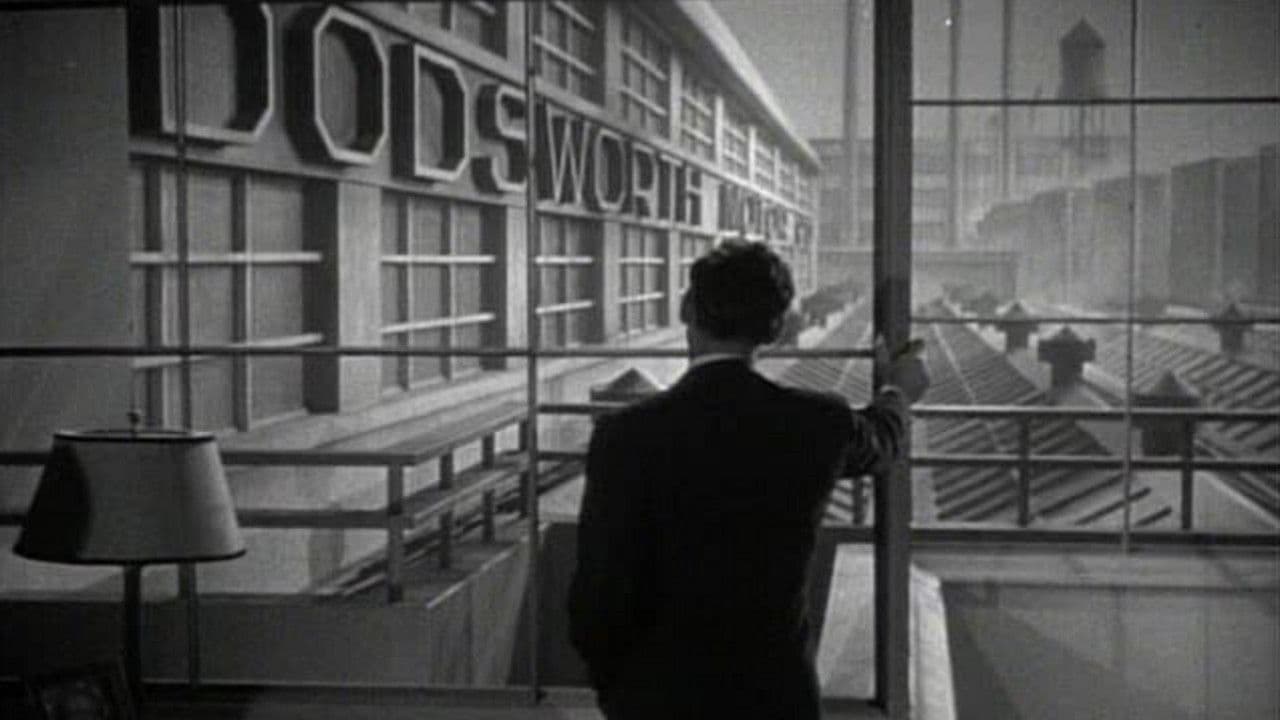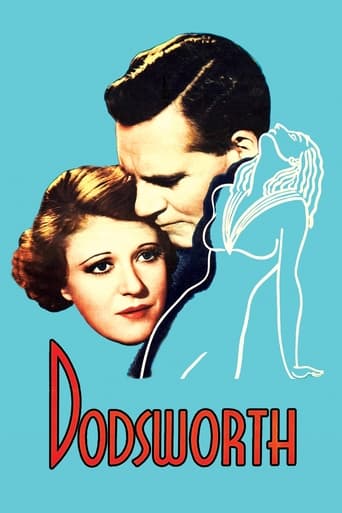



Good films always raise compelling questions, whether the format is fiction or documentary fact.
View MoreEach character in this movie — down to the smallest one — is an individual rather than a type, prone to spontaneous changes of mood and sometimes amusing outbursts of pettiness or ill humor.
View MoreThere's no way I can possibly love it entirely but I just think its ridiculously bad, but enjoyable at the same time.
View MoreAll of these films share one commonality, that being a kind of emotional center that humanizes a cast of monsters.
View MoreCopyright 28 September 1936 by Samuel Goldwyn. Released through United Artists. New York opening at the Rivoli, 23 September 1936. U.S. release: 18 September 1937 (sic). U.K. release: November 1936. Sydney opening at the Embassy: 1 January 1937. 9,138 feet. 11 reels. 101 minutes.SYNOPSIS: Disillusioned American industrialist "finds himself" in Europe.NOTES: Academy Award, Richard Day, Art Direction (defeating Anthony Adverse, The Great Ziegfeld, Lloyds of London, The Magnificent Brute, Romeo and Juliet and Winterset).Also nominated for Best Picture (won by The Great Ziegfeld); Best Actor, Walter Huston (won by Paul Muni for The Story of Louis Pasteur); Supporting Actress, Maria Ouspenskaya (won by Gale Sondergaard for Anthony Adverse); Directing (won by Frank Capra for Mr Deeds Goes To Town); Screenplay (won by The Story of Louis Pasteur); and Sound Recording (won by San Francisco).Best Male Performance of 1936: Walter Huston — New York Film Critics. Number 5 on The Film Daily annual poll of U.S. film critics.COMMENT: Opening on Broadway at the Shubert on 24 February 1934, the stage play was a great success, running 317 performances. Walter Huston played Samuel Dodsworth, his frivolous wife was Fay Bainter, whilst his lady-love was enacted by his real-life wife, Nan Sunderland. Others in the stage cast included Maria Ouspenskaya, John Williams, Frederic Worlock, Kent Smith, Hal K. Dawson, Harlan Briggs and Ethel Jackson. Robert Sinclair directed for producer Max Gordon.The acting may be a bit stagy, maybe just a trifle old-fashioned and self-conscious, but there's no denying the abilities of Huston (repeating his stage role), Chatterton and Astor. The story holds up particularly well — in fact I doubt if any producer would dare such a realistic domestic drama even today (in these so loudly trumpeted "liberated" times) — and comes across with considerable force and power.The movie is superbly paced, masterfully directed and brilliantly photographed (notice the most effective use of deep focus — and this is Maté not Toland — years before Citizen Kane). Newman's music is beautifully atmospheric. All told, Dodsworth provides ample evidence of big-budget technical expertise in all departments.
View MoreSuccessful auto manufacturer Sam Dodsworth (Walter Huston) retires at the urging of his wife (Ruth Chatterton). He takes her on a European vacation she desperately wants. Unfortunately poor dumb Dodsworth doesn't realize his vain, shallow wife has already emotionally checked out of their marriage and is looking for something more exciting.Wonderful lead turns by Huston and Chatterton. The rest of the cast is about as good as it gets: Mary Astor, Paul Lukas, David Niven, Spring Byington, John Payne, and the great Maria Ouspenskaya. Classic based on Sinclair Lewis' novel and beautifully-directed by William Wyler. It's a very sophisticated and mature film for the time. Highly underrated.
View MoreThis movie was nominated for Best Picture, Best Director, and Best Actor (Walter Huston). That's because it's one very impressive movie.Of a different sort.Like the novel, Sinclair Lewis' Dodsworth, this is the story of an older man who has arrived at retirement but discovers that he has no identity other than his work. His wife, a thankless role taken by Ruth Chatterton, can't deal with growing older, and destroys their marriage by flirting with men in an effort to convince herself that she can still pass for young.But that isn't Dodsworth's issue. After 20 years of being a very successful business executive, he only knows how to define himself in terms of business deals. When he has no deals to arrange, he has no feeling of accomplishment or self-worth.It takes a major readjustment for him to discover that he can also be someone else, and find fulfillment in something else. It doesn't come easily to him, but he does finally find it.Like Lewis' novel, this is a story particularly suited to American men who are themselves arriving at retirement and will need to find another way of seeing themselves. The novel is even better, but this is one very fine movie. Do something else during the first 50 or so years of your life. But then, as retirement starts to loom, read the book and watch this movie. It will give you something to think about as you start your second life - so that it is, indeed, a life.--------------------------------After another viewing: If you take a great script, have it performed by uniformly first-rate actors under the helm of a first-rate director, you might, if you're lucky, get a film as good as "Dodsworth". You might, if you're lucky. This is really one first-rate movie. If you've never seen it, treat yourself.
View MoreWhen people use that old catch phrase "They don't make 'em like they used to," it is usually a bunch of hooey. In this case, it would be correct. I am hard-pressed to remember a character-driven drama from the last 20-30 years that falls within the same purview as Dodsworth.Dodsworth is played by Walter Huston and is an American automobile tycoon, who has managed to retain his down-to-earth outlook and continue to find new wonders to experience in life as he gets older. He embarks on a second honeymoon to Europe with his frivolous wife Ruth Chatterton. The journey shines a rather harsh light on their marriage and leads to an estrangement, as the vainglorious Chatterton hares around in a desperate attempt to hang on to her vanishing youth by encouraging the attentions of younger suitors and empty-headed socialites. By contrast, Dodsworth is unafraid to grow old and still finds new things to keep him going. While attempting to maintain his foundering marriage as it heads into estrangement, he meets and falls in love with ex-patriot divorcée Mary Astor, who embodies the maturity and genuine love that his own wife fails to possess.There are no action pieces and no great comedic moments in Dodsworth, but the film is always entertaining thanks to great writing and acting. The film is never heavy and always seem vaguely pleasant, even when dealing with some harsh realities and character defects. Much of that is due to how interesting the characters that populate the landscape are and how emotionally invested we have become in their exploits. It is hard to imagine such a film being made today - especially without some big emotional moment where someone is allowed to hit every note from A to Z in order to rouse the audience. This is old-time storytelling at its peak.Huston contributes a performance of amazing depth and versatility. His Dodsworth is a sympathetic figure and we root for him to find the degree of happiness that he deserves. From the moment on a luxury liner deck where he conveys a child-like wonder at a far-off light in the night (which is characteristically dismissed as uninteresting by his wife) to the latter moments in the film where he comes to accept how things must be and takes action to move on for the best, Huston's performance holds the viewer in the palm of his hand. He never seems to be acting, so much as existing.Chatterton is quite effective as his shallow wife. Her character could have been one-note, but Chatterton (especially in the film's latter moments) conveys the desperation and fright of a vain woman fearing the approach of her maturity and fighting tooth and nail against it. By contrast, Mary Astor has never been more appealing in a performance of warmth and charm. We have no doubt that she is the better match for Dodsworth and wonder whether Dodsworth will start anew with her or continue to pine for the wife that only loves herself. Another scene-stealing performance is contributed by the grand character actress Maria Ouspenskaya, as a member of European nobility who puts the kibosh on a romance between Chatterton and her younger son, and provides a much needed comeuppance character assessment in the process. It is a most satisfying screen moment that is well-acted by both women.Despite being made in the 1930s, it is amazing how contemporary the film feels to the modern day viewer. The film has aged exceedingly well and remains a jewel in the crown from Hollywood's most glorious period. The fact that so many modern viewers have never heard of it is a true shame.
View More